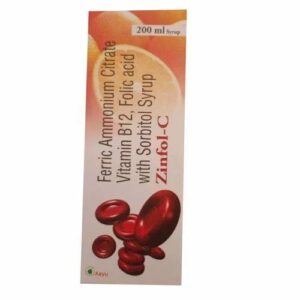B12 (CYANOCOBALAMIN) + NA + FOLICA AICD
B12 (cyanocobalamin): B12, also known as cyanocobalamin, is a synthetic form of Vitamin B12. It is a water-soluble vitamin that is essential for various bodily processes, including the formation of red blood cells, DNA synthesis, and proper functioning of the nervous system.
Cyanocobalamin is primarily used to treat or prevent Vitamin B12 deficiency, which may occur due to poor dietary intake, certain medical conditions, or as a result of surgeries that remove part of the stomach or small intestine. It is also sometimes used in the treatment of certain types of anemia.
The mechanism of action of cyanocobalamin involves its conversion into coenzyme B12 (methylcobalamin or adenosylcobalamin) in the body. These coenzymes are necessary for the normal synthesis of DNA and red blood cells. Additionally, cyanocobalamin plays a role in the metabolism of fatty acids and amino acids.
Cyanocobalamin is typically administered as an intramuscular injection. The dosage depends on the specific condition being treated, but a common dose for adults is 1000 mcg injected once per week for several weeks or months, followed by a maintenance dose of 100-1000 mcg injected once per month.
Like most medications, cyanocobalamin can have some side effects. Common side effects include mild diarrhea, nausea, headache, and pain at the site of injection. These side effects are usually temporary and resolve on their own.
Rare but serious side effects may include allergic reactions, such as rash, itching, swelling, severe dizziness, and difficulty breathing. If any of these occur, immediate medical attention should be sought.
It is important to note that cyanocobalamin should only be used under medical supervision, as it may interact with certain medications or medical conditions. Additionally, it is important to address the underlying cause of the Vitamin B12 deficiency to prevent recurrence.
Overall, cyanocobalamin (B12) is an important medication used to treat or prevent Vitamin B12 deficiency and related conditions. It helps support normal bodily functions, especially those related to red blood cell formation and nervous system health.
Na: I’m sorry, but “Na” is not the name of a specific drug. “Na” is actually the chemical symbol for sodium on the periodic table of elements. Sodium itself is an essential mineral found in many foods and is an important electrolyte in the body. However, since you mentioned it as a drug, I assume you might be referring to a medication with a different full name or specific formulation.
If you can provide the complete name or a more specific description of the drug you are referring to, I would be happy to assist you further by providing information on its use, mechanism of action, dosage, and potential side effects.
Folica Aicd: I believe there may be a typo in the name you provided, as “Folica Aicd” does not match any known drug. However, if you meant to refer to “Folic Acid,” I can provide information on that.
Folic Acid, also known as Vitamin B9 or folate, is a synthetic form of folate that is commonly used as a dietary supplement and medication. Folic Acid is essential for the production and maintenance of new cells, and it plays a vital role in DNA synthesis and repair.
Its use mainly revolves around preventing and treating folate deficiency, which can lead to a variety of health issues such as anemia, neural tube defects in pregnancy, and certain types of cancer. Folic Acid is also prescribed in combination with other medications to treat certain types of anemia or to support the effectiveness of certain medications that affect the production of red blood cells.
The recommended dose of Folic Acid depends on the specific medical condition being treated. For most adults and adolescents, a typical daily dose ranges from 400 to 800 micrograms (mcg). Pregnant women typically require a higher dose, usually around 600-800 mcg. However, it’s important to note that the correct dosage should be determined by a healthcare professional based on individual needs.
Folic Acid is generally considered safe when used in appropriate doses. However, like any medication, it may cause some side effects. Common side effects include digestive issues such as nausea, bloating, gas, and a bitter or unpleasant taste in the mouth. These side effects are usually mild and temporary. Serious side effects are rare but can occur in individuals who are allergic or hypersensitive to Folic Acid.
It’s important to consult with a healthcare professional or pharmacist before starting any medication, including Folic Acid, to ensure proper dosage and to discuss any potential drug interactions or contraindications based on individual health factors.

